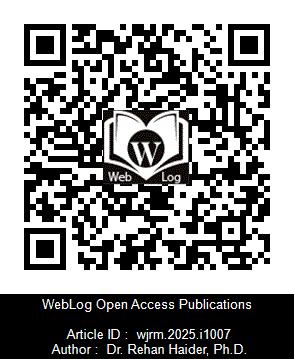
ARTICLE TYPE : RESEARCH ARTICLE
Published on : 10 Sep 2025, Volume - 1
Journal Title : WebLog Journal of Reproductive Medicine | WebLog J Reprod Med
Source URL: ![]() https://weblogoa.com/articles/wjrm.2025.i1007
https://weblogoa.com/articles/wjrm.2025.i1007
Permanent Identifier (DOI) :  https://doi.org/10.5281/zenodo.17105066
https://doi.org/10.5281/zenodo.17105066
Anti-Cancer Potential of Egyptian Women’s Breast Milk: Effects on Liver and Colon Tumor Cells
2Assistant Professor, Department of Pathology, Dow University of Health Sciences (DUHS), Karachi, Pakistan
Abstract
Abstract: Human breast milk is a unique bio-fluid rich in nutrients and bioactive molecules, including proteins with potential therapeutic applications. Among these, the α-lactalbumin–oleic acid complex, known as HAMLET (Human Alpha-lactalbumin Made Lethal to Tumor cells), has been reported to selectively induce apoptosis in tumor cells while sparing normal cells. While previous studies have primarily focused on Western populations, limited research has investigated the anti-cancer properties of breast milk in North African populations. This study evaluates the cytotoxic effects of Egyptian women’s breast milk on liver (hepatocellular carcinoma) and colon tumor cell lines. Breast milk samples were collected from healthy lactating women in Egypt and processed to isolate bioactive protein–lipid complexes. In vitro assays, including MTT viability tests, flow cytometry, and morphological assessments, were conducted to assess tumor cell death and apoptotic induction. The results demonstrate that Egyptian breast milk significantly reduces the viability of both liver and colon tumor cells in a dose-dependent manner. Microscopic and molecular analyses confirm the induction of apoptosis and cellular stress pathways in tumor cells, while normal hepatocytes and colon epithelial cells remain largely unaffected. These findings indicate that Egyptian breast milk contains bioactive components capable of selectively targeting tumor cells, supporting the universal presence of HAMLET-like complexes across human populations. This research highlights the potential of human breast milk-derived compounds as novel, natural anti-cancer agents and provides a foundation for future clinical investigations in hepatocellular carcinoma and colorectal cancer, diseases with high prevalence in Egypt and worldwide.
Keywords: Egyptian Breast Milk; HAMLET; Liver Cancer; Colon Cancer; Α-Lactalbumin; Anti Cancer Activity; Apoptosis
Citation
Haider R, Ahmed Z. Anti-Cancer Potential of Egyptian Women’s Breast Milk: Effects on Liver and Colon Tumor Cells. WebLog J Reprod Med. wjrm.2025.i1007. https://doi.org/10.5281/zenodo.17105066